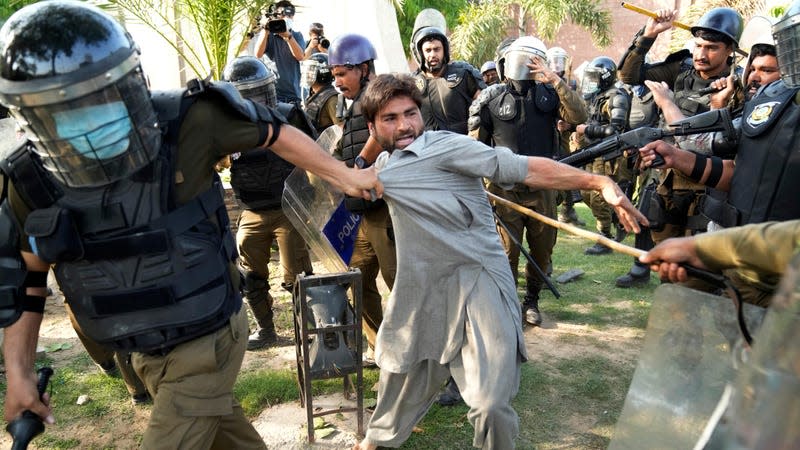Pakistan Internet Restrictions Could be 'Indefinite'

Police surround and detain a protestor on Wednesday amid mass demonstrations against the arrest of former prime minister, Imran Khan.
People in Pakistan are facing significant, ongoing restrictions to their internet access following political protests and the arrest of the country’s former prime minister. The Pakistan Telecommunication Authority (PTA) confirmed that it intentionally cut off mobile internet service beginning Tuesday, according to Geo News—a Pakistani outlet. The blackout has continued into Wednesday, and mobile internet will remain “suspended for an indefinite period” on instruction from the interior ministry according to a second Geo News report.
In addition to mobile web services being blocked, major social online platforms like Facebook, Instagram, YouTube, and Twitter have become inaccessible across the country, according to a report from international watchdog group NetBlocks. Full internet blackouts have also been reported in certain Pakistani regions, according to NetBlocks and additional reports from The Guardian and Al Jazeera.
Read more
These Winning Close-Up Photos Show Life That's Often Overlooked
Remembering Enterprise: The Test Shuttle That Never Flew to Space
⚠️ Update: Metrics show internet blackouts and social media restrictions remain in place in #Pakistan; the measures were imposed on Tuesday amid the arrest of former PM Imran Khan and continue to limit the public's right to stay informed 📵
📰 Report: https://t.co/BCs5hPpTsU pic.twitter.com/X9FICEAIyy— NetBlocks (@netblocks) May 10, 2023
Gizmodo reached out to PTA to confirm these reports and get more details on internet restrictions. The national agency didn’t respond to an email sent to its complaints address, as of publication time. A phone call to the PTA’s public relation outside of local business hours rang for 2+ minutes without leading to a voicemail or a person’s answer. Attempting to submit an inquiry on the authority’s website form led to an error message.
The web restrictions come on the heels of mass protests in the cities of Islamabad and Lahore. Supporters of the country’s former populist prime minister, Imran Khan, took to the streets in response to the politician’s arrest. Eight people have been killed in the protests, and about 1,000 have been arrested, according to police as reported by the BBC.
Videos of this week’s protestors and police began to circulate widely across social media platforms on Tuesday, according to Geo News. Likely, the PTA restricted internet access as a means of shutting down the spread of such recordings.
Khan, a former star cricket player, served as prime minister from 2018 to 2022, until he was ousted from office through a no-confidence motion last year. Khan has blamed the U.S. and other western political powers for his forced removal from power. Now he is facing corruption charges, which he has denied and pleaded not guilty to. If convicted, he would be barred from holding political office in the future.
NetBlocks condemned the ongoing internet blackouts. The watchdog wrote it “recommends against the use of network disruptions and social media restrictions to limit political speech, given their disproportionate impact to fundamental rights,” in its report.
Amnesty International, too, decried Pakistan’s internet shutdowns. “This restricts people’s access to information and freedom of expression. We call upon the Pakistan Telecommunications Authority and Interior Ministry to immediately reverse this ban,” the South Asia regional office of the human rights NGO wrote in a tweet.
🇵🇰Pakistan: Amid concerns about escalating clashes between Imran Khan’s supporters and the police, Amnesty International is alarmed by reports that Pakistani authorities have suspended mobile internet and access to Twitter, Facebook and YouTube.
— Amnesty International South Asia, Regional Office (@amnestysasia) May 9, 2023
This is far from the first time that Pakistan has moved to restrict online access within its borders. In February, the PTA briefly banned Wikipedia over “anti-Islam” content on the site. In 2018, the country enacted three internet shutdowns in a single week, and 11 throughout the whole year, according to a report from AccessNow. There were six internet shutdowns in Pakistan between July 2015 and June 2016, according to a report from the Brookings Institute. And, all the way back in 2010, a PTA press release shows that the Pakistani government once banned all access to Facebook.
Despite bans on certain platforms though, many in the country continue to access social media and other sites through the use of VPNs. The country’s largest English-language news outlet, Dawn, even published an article on Wednesday explaining its own reliance on a VPN to continue publishing.
More from Gizmodo
Sign up for Gizmodo's Newsletter. For the latest news, Facebook, Twitter and Instagram.

